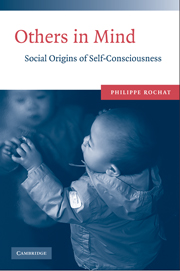Book contents
- Frontmatter
- Contents
- Foreword by Jerôme Bruner
- Preface
- Introduction: Main Ideas
- 1 Self-Conscious Species
- 2 Six Propositions
- 3 Varieties of Self-Reflective Mind State
- 4 Mind States in Development
- 5 Birth of Self-Consciousness
- 6 Shame and Self-Knowledge
- 7 The Roots of Guilt
- 8 Giving and Sharing
- 9 Origins of Owning and Sharing
- 10 Social Construction of Identity
- Conclusion: Moral Space and the Self
- Postscript Note
- References
- Index
10 - Social Construction of Identity
Published online by Cambridge University Press: 05 August 2012
- Frontmatter
- Contents
- Foreword by Jerôme Bruner
- Preface
- Introduction: Main Ideas
- 1 Self-Conscious Species
- 2 Six Propositions
- 3 Varieties of Self-Reflective Mind State
- 4 Mind States in Development
- 5 Birth of Self-Consciousness
- 6 Shame and Self-Knowledge
- 7 The Roots of Guilt
- 8 Giving and Sharing
- 9 Origins of Owning and Sharing
- 10 Social Construction of Identity
- Conclusion: Moral Space and the Self
- Postscript Note
- References
- Index
Summary
There is no truth in you,
There is no truth in me,
It is between.
From “Truth Serum,” a song written and performed by SmogDescartes's cogito (“I think, therefore I am”) is tainted with circularity. Descartes claims his existence, but this claim presupposes an “I” as an a priori. It does not exhaust the question of self-consciousness. When he claims cogito, ergo sum – “I think, therefore I am” – one is left with the question, Who is talking to whom? Who is the “I”? In general, what do we perceive and what do we represent as “I”? These are the basic, unanswered questions of self-consciousness.
The issue is profound, and it is hard not to fall into Descartes's circularity trap when dealing with the issue of self-consciousness. How can we talk about ourselves and try to specify who we are when such talk presupposes us as talkers? It is as impossible as trying to construe one's own death when immersed in life, as impossible as construing oneself deaf and mute when talking and listening. How could we construe ourselves as nothing since our thoughts require that we are something? How could we construe ourselves as nobody since this reflection implies us as thinkers and feelers? Arguably, this is a contradiction in terms and an impossible quest.
However, in this chapter, I propose that there is a piece that is fundamentally missing in the quest of who we are in the Cartesian tradition.
- Type
- Chapter
- Information
- Others in MindSocial Origins of Self-Consciousness, pp. 191 - 212Publisher: Cambridge University PressPrint publication year: 2009



